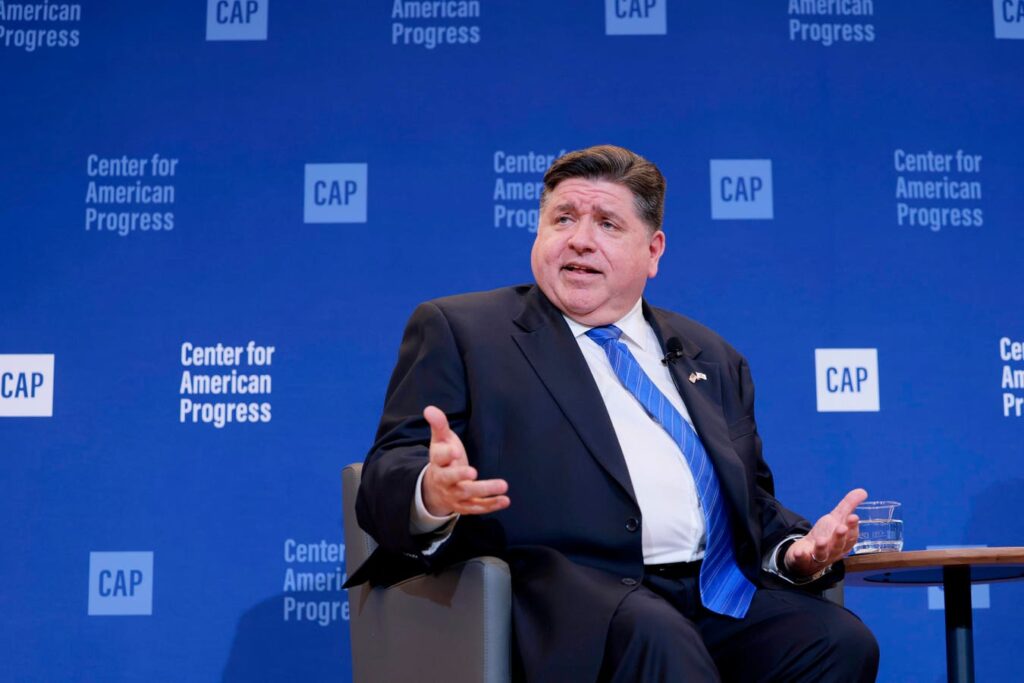WASHINGTON, DC – MARCH 18: Illinois Gov. J.B. Pritzker speaks at the office of The Center for … More
Illinois Governor J.B. Pritzker’s (D) April visit to New Hampshire, site of the nation’s first presidential primary, is fueling speculation about a prospective White House bid in 2028. During his speech in the Granite State, the Illinois Governor criticized various aspects of President Donald Trump’s first 100 days back in office, noting that “small businesses don’t deserve to be bankrupted by unsustainable tariffs.” The Governor’s tariff criticism, however, will sound hypocritical to many of those familiar with legislation that Pritzker has championed in the past, along with new progressive bills heading toward his desk that he might sign later this year.
At the same time that Governor Pritzker is hitting President Trump’s tariffs for driving up costs for employers and consumers, however, legislation is working its way toward Pritzker’s desk that would impose new costs on employers, particularly small businesses, and reduce convenience for families across Illinois. Take Senate Bill 1531, legislation that would ban disposable food containers made of polystyrene foam beginning in 2030. SB 1531 passed out of the Illinois Senate on April 30 and now awaits consideration by the Illinois House. As an enforcement mechanism for this new food container prohibition, SB 1531 imposes a $1,000 fine for all infractions beyond the first one.
In addition to that new food container ban proposal, Illinois lawmakers are also considering legislation to ban plastic shopping bags statewide, something a dozen states have done. That bill, Senate Bill 1872, would also apply a 10 cent tax to every paper bag used at checkout. It will be hard for Governor Pritzker to hit President Trump for the regressive nature of new tariffs when Pritzker himself is signing into law regressive tax hikes like the one SB 1872 would levy on paper bags. “As Gov. Pritzker has vehemently opposed President Trump’s tariff plan and its pending impact to small businesses, the timing of this legislation seems off,” notes Bryce Hill, director of fiscal analysis for the Illinois Policy Institute.
Enactment Of Cost-Increasing Legislation Makes It Harder For Pritzker To Attack Trump’s Tariffs
Should SB 1531 make it to Governor Pritzker’s desk and he sign it, that would provide fodder for anyone who wishes to paint Pritzker’s attacks on Trump as hypocritical. The incongruence between attacking the President for imposing new costs on small businesses through tariffs while also supporting state legislation to impose new costs on small businesses will be a politically inconvenient fact for Governor Pritzker to explain.
During his April speech in New Hampshire, Governor Pritzker postured as defender of small business, yet it’s hard to square that perception with the fact that Pritzker has spent millions advocating for income tax rate hikes that would fall on most small businesses. Pritzker, for example, led the charge for a 2020 ballot measure that would allow him to impose progressive state income tax hikes that would reduce the job creating and sustaining capacity of small businesses across Illinois. While that proposal was rejected by more than 53% of Illinois voters, critics say the campaign demonstrated that Pritzker is no champion of small business.
“Gov. J.B. Pritzker does a lot for show and soundbites that don’t add up to good policy for everyday Illinoisans or business,” the Illinois Policy Institute’s Bryce Hill added. “While he should be easing the onerous financial burden on Illinois’ businesses, he’s instead looking for new costs and regulations to tack on. Small businesses in Illinois are subject to the third-highest corporate income tax rate in the nation, which has hurt economic growth and contributed to Illinois seeing one of the slowest pandemic recoveries. Pritzker also hit businesses with $650 million in tax hikes during the pandemic, plus another $186 million in tax hike in last year’s budget alone.”
“Businesses with under 20 employees, including many restaurants and bars, added nearly 31,000 jobs to the state in 2023,” Hill added. “These small businesses are the only ones to add to Illinois’ job market since the pandemic. If Pritzker really cared about Illinois small businesses, he’d make improving the state’s hostile business environment his top priority.”
The fact that Illinois continues to experience net population loss as a result domestic outmigration to other states does not discourage Pritzker from talking about Illinois as a model for good governance. “I’m one of the people leading the fight, and that is my role,” Governor Pritzker said in an interview conducted during his visit to New Hampshire. “We’ve done an awful lot in Illinois, and we can be doing those things in other states.”
Pritzker’s talk about exporting Illinois-style policies to other states, however, is unlikely to sound appealing to the tens of thousands of individuals and families who have fled the Land of Lincoln since 2019, the year Pritzker took office. If the plastic bag ban coupled with the paper bag tax, or the polystyrene food container prohibition make it to his desk, Pritzker will soon have a consequential decision to make. Pritzker will have to decide whether to sign more legislation that makes progressives happy, but which also drives up costs for employers and undercuts his attacks on President Trump.
Read the full article here
